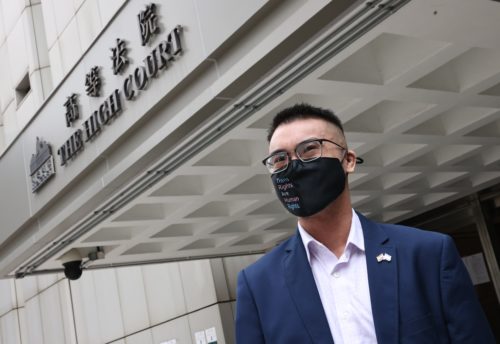China’s proposed ban on online sales of hormone drugs concerns transgender women
As China moves forward with a draft rule that would prohibit online selling of hormone medications, transgender women in the country fear the consequences.

November 20 marked the annual Transgender Day of Remembrance (TDOR), which commemorates transgender people who lost their lives to anti-transgender violence. The day was observed by the Chinese transgender community, where LGBTQ media has used the occasion this year to specifically raise awareness about the death of a trans woman in Wuhan in March.
Just a few weeks previously, a message circulated in Chinese transgender groups directed public attention to a new government policy announced in early November and the potential negative impacts it may cause on trans women. Having recently passed the phase of public consultation, the policy proposes to tighten control of a list of prescription medications by prohibiting online sales. The main consideration behind the potential policy change was that the targeted medications might trigger “higher potential health risks” if used inappropriately.
China’s transgender community is primarily concerned about one hormone medicine on the list, estradiol. A type of female sex hormone, estradiol is often prescribed in the treatment of menopausal symptoms for cisgender women, but it is also used as a major medication for trans women in gender-affirming hormone therapy, a medical treatment that helps align a trans man, trans women, or non-binary person’s physical characteristics with the person’s gender identity.
As with several other hormone medicines, estradiol is a prescription drug in many countries, including China. According to a guidebook on trans hormone therapy released by the British National Health Service (NHS), professional instructions and follow-up monitoring are necessary for patients taking the treatment. As the course of the treatment usually lasts for several years and for some people, a lifetime, adjustments are often needed to better fulfill personal needs and lower potential health risks.
However, advice and service from medical professionals is much lacking in China. According to a 2017 national survey that received 1,922 valid responses from transgender individuals, 61.9% of trans women, 70.4% of trans men, and 36.7% of people who identify as non binary or genderqueer were seeking hormone treatment, but 71.7% of them “reported difficulties accessing medications from medical providers or obtaining safe and reliable information about hormone.” Only 6.3% said they were “satisfied” with the treatment they received.
Another report released by Amnesty International in 2019 noted that although China has regulations on gender reassignment surgery, which in the newest update in 2022 lower the minimum age for the surgery and simplifies a few other prerequisites, they fall short of standardizing hormone treatment.
Unable to access trans-friendly doctors, many trans people have to resort to other approaches. Some turn to the black market, where counterfeit drugs are sold and proper guidance is lacking. Others manage to obtain prescriptions from online pharmacies with female ID cards borrowed or stolen from their family members or friends — a popular method that might become useless if the aforementioned new policy is passed.
A California-based Chinese transgender woman in her thirties who prefers to be called by the name “White Rose” (白玫瑰 báiméiguī) told The China Project that after moving to the U.S. for Ph.D. study recently, she found that medical care in California is much more accessible and friendlier for trans people compared to her experience back in China.” In California, after accepting basic evaluations and medical examinations from a gender care team, she was referred to an endocrinologist for hormone treatment. After the initial appointment, she has been visiting the same clinic every three months to make necessary adjustments.
“But this kind of standardized service is scarce in China,” White Rose said. “It is very difficult to find a doctor who can prescribe hormone treatment for trans people. And even for those who have already obtained the drugs via other approaches, self-medication still entails interactions with hospitals.”
In China, to properly monitor their bodily hormone levels in the course of taking hormone drugs, trans women need to go through a specific medical examination that is usually assigned by gynecologists to cisgender women. Some would choose to negotiate with the doctors to access the exam, while others like White Rose would skip medical professionals due to the “the potential embarrassment”when disclosing their gender identity to a stranger who is unlikely to have much knowledge about trans issues,” she said.
White Rose’s experience speaks to some of the differences in transgender healthcare between China and the U.S., but she also notes that California, as one of the most progressive states in providing affirming trans care, does not represent the entire country, and trans people still have struggles in other American states like Florida, which voted in October to start drafting a rule that will ban puberty blockers, hormone therapy and surgeries for trans youths under 18.
Meanwhile, positive changes are also happening in China. One hospital in Beijing has established a “Gender Dysphoria Clinic” that provides more comprehensive and affirming services for trans people, becoming one of the very first few in the country. This is also the place where White Rose finally obtained reliable and systematic hormone treatment in a friendly environment.
Acknowledging the support provided by the hospital, White Rose also remarked that one institution cannot fulfill the needs of the entire nation’s trans people. She recalled that it was difficult to make an appointment due to the demand-supply mismatch. Living in Shanghai at the time, she had to travel to Beijing for each medical visit and sometimes needed to stay there for an additional one or two days, which generated extra expenses. Since 2020, it has become more difficult to access the clinic as China’s strict COVID-19 policy imposes restrictions on cross provincial trips. The pandemic policy has also impeded trans people’s access to hormone medications via online shopping, as logistics services have been interrupted repeatedly.
Commenting on the proposed policy, White Rose said that it’s difficult to draw an overall evaluation given all the complexities. “Even if the policy is passed, the implementation might vary between regions. Meanwhile, within the trans community, people have different needs regarding hormone treatment and different resources in accessing what they need,” she said. “The policy might not be targeted at the trans population, neither would it be devastating for the community, but the increasing restrictions do make people worry about the shrinking of options and space.”

Other LGBTQ stories from China:
A new trans care handbook has been released (Beijing LGBT Center)
Beijing LGBT Center and the Series Therapy of Trangender at Peking University Third Hospital have co-released a new handbook for trans medical care.
Mainland Chinese director’s LGBTQ film wins an award on Taiwan’s “Chinese Oscars” (Intium)
Chinese film director Huáng Shùlì 黄树立 has won a Golden Horse Award for his LGBTQ-themed short film Will You Look at Me. Huang attended the ceremony in Taipei to receive his award, becoming the first mainland Chinese citizen working in the film industry to show up in what’s considered to be “Chinese Oscars” since the Taiwan-based prestigious event was boycotted by mainland China in 2019





